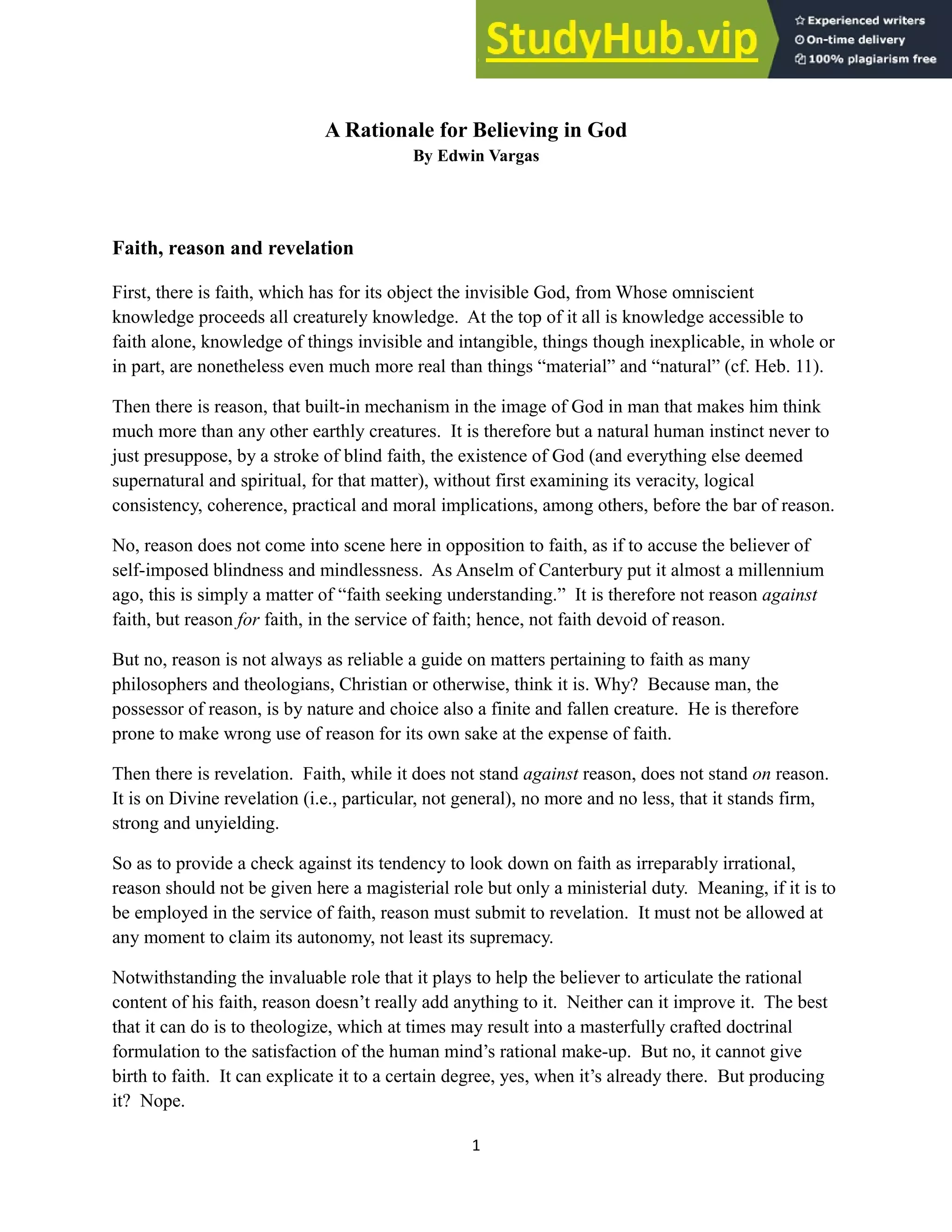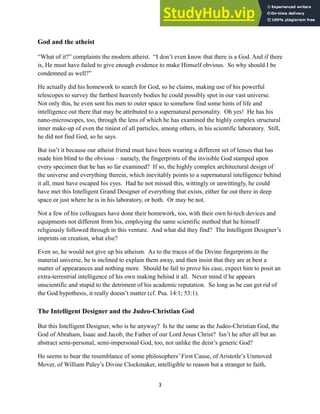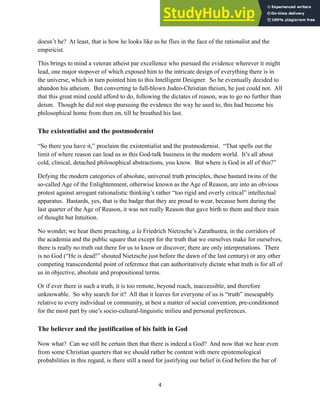This document discusses different perspectives on faith, reason, and revelation as they relate to believing in God. It makes the following key points:
1) Faith is based on revelation from God, while reason examines faith logically but should be subordinate to revelation. Reason can explain faith but not produce it.
2) Both Gentiles and Jews suppressed the truth about God revealed in nature due to sinfulness, and no one seeks God or understands without divine grace.
3) While evidence of design in the universe points to an Intelligent Designer, this does not necessarily prove the God of Christianity, and reason alone can only lead to deism, not faith. Existentialists and postmodernists reject rational proofs of

![Those who insist that they can prove the existence of God by empirical evidences and/or
philosophical abstractions, and in the process convert an unbelieving audience to a belief system
in a generic God (of deism, not of Judeo-Christian theism), are therefore dead wrong. Natural
theology, or philosophy of religion, as this discipline is known today in academia, may have
nature for its book and reason for its interpreter. But an object to be believed in, it really doesn’t
have. Why? Because the kind of god that it can project, is either too small (like a pagan
miniature god) to be worthy of worship, or too transcendent and distant (like the philosopher’s
abstract god) to be embraced by faith.
Granted, reason can detect some traces of the Divine in nature, which stubbornly displays His
majesty and power for every creature to see (Psa. 19:1-6). But as to who God is in relation to us,
the best that it can afford to offer is to speculate and approximate. Such an almost purely
academic exercise may build a case for the existence of God. But it all stops there. It doesn’t
draw man to God. Indeed, it cannot, because it lacks the grace that saves, which only emanates
from special revelation, obtainable by faith alone, which in turn is but a gift of grace.
Gentiles and Jews
Listen in to what the Apostle Paul has to say in regards to what the ancients did to the general
revelation of God in nature about Himself. First, he speaks of God’s wrath revealed from heaven
against sinful humanity (Rom. 1:18a). Then, rather too quickly, we hear him talking about how
they suppressed the truth content of this revelation by their unrighteousness (v. 18b). This, in
spite of the fact that “what may be known about God is plain to them, because God has made it
plain to them” (v. 19 NIV).
Rational and relational creatures that they were, they actually knew something about God on
account of this revelation (v. 20), made possible all the more by what a leading Reformation
theologian dubbed as the divinely instituted sense of deity (sensus deitatis) and seed of religion
(semen religionis) in man (v. 32; 2:14-15). Still, “they did not honor him as God or give thanks
to him,” so “they became futile in their thinking, and their foolish hearts were darkened” (v. 21).
Consequently, they fell into the trap of rampant idolatry and unbridled immorality (vv. 22-32).
Look at what happened to reason here. It was assaulted and violated by depraved humanity.
That’s irrationalism at its worst! As to God’s general revelation, it could do no other but the
reasonable: to stand in judgment as a witness against them, so “they are without excuse” (v. 20).
Mind you, all of us, Gentiles, medieval, modern and postmodern, are likewise guilty of the same.
And so are all the Jews who were entrusted by God Himself with things much, much better off
than general revelation (Rom. 2:1-29; 3:9; 9:4-5). So we hear the verdict: “[As] it is written:
‘None is righteous, no, not one; no one understands; no one seeks for God’ … for all have sinned
and fall short of the glory of God” (vv. 10-12, 23).
2](https://image.slidesharecdn.com/arationaleforbelievingingod-230805184025-f57d8421/85/A-Rationale-For-Believing-In-God-2-320.jpg)


![reason? Of course, there is, but not in the manner typically laid down by not a few Christian
theologians, philosophers and apologists in the past three centuries or so.
First, a couple of clarifications are in order. As already hinted at above, the God that is being
referred to here is no other than the God of the Bible, not the generic god of philosophical
abstractions. At the same rate, belief in this God, as it is discussed here, and as the Bible itself
clearly teaches, is more than mere mental assent; a philosophical yes, and nothing more. Rather,
it is a faith that proceeds from having known God personally and savingly (Rom. 10:17; Jn.
17:3), with its moral and spiritual ramifications (Mat. 7:21-27; Eph. 2:8-10; Jas. 2:14-26).
Faith, or belief in God, for that matter, as the Bible puts it, is first a product of, and then a joyous,
humble response to divine revelation specifically narrated in and proclaimed by the biblical
gospel (Rom. 10:17; Mat. 11:25-27). What used to be blurred beforehand, obscured by so thick a
darkness brought about by sin’s secret operation in the human heart and mind, inaccessible to
reason’s investigative arsenal, dreadfully unapproachable because of its inherent holiness, is
suddenly disclosed in broad daylight for the undeserving sinner to behold.
This is beautifully illustrated in the New Testament Scripture in Peter’s answer to Jesus’
question, “Who do you say that I am?” “You are the Christ, the Son of the living God,” was
Peter’s quick reply. About which Jesus was as quick to say that such a confession of faith by this
particular disciple of His was in fact a revelation from His Father in heaven (Mat. 16:15-17).
As a general rule, what this revelation accomplishes at first results into a deep, penetrating sense
of one’s utter sinfulness and unworthiness before God against the backdrop of His life-
threatening holiness and blinding glory. His heart deeply broken by such a realization, the
recipient of this revelation cannot help but confess his sins, and if given the chance to remain
alive, make a resolve to forsake it (e.g., Isa. 6:1-5; Luk, 18:13; 1 Thes. 1:4-9). But no, this is not
faith yet, for what is in view here only reflects the law of God that condemns sinners (Gal. 3:10).
It is rather known for its rightful name: Repentance.
But then there comes something more out of this Divine unveiling that makes it so sweet and
desirable, albeit humbling like no other: Grace!
The repentant sinner has now heard the best of good news: that his sins have been atoned for
once and for all by the death of God’s only Son, Jesus Christ, on the cross, who did not remain
dead but on the third day rose again from the grave, now alive, victorious and glorious for all
eternity! In an instance, he who was “dead in [his] trespasses” is “made alive together with
Christ” (Eph. 2:5). So that he who in his depravity could find no reason to believe because of his
blindness, and no ability to do the same whatsoever because he was lifeless, now confesses his
faith in Jesus, and in Him alone, with unspeakable gladness. He knows he doesn’t deserve this.
Neither can he contribute anything to it. So that even his acts of repenting and believing he can’t
call his own. It is purely a work of grace (Eph. 2:8-9); indeed, wholly a work of God, not a
5](https://image.slidesharecdn.com/arationaleforbelievingingod-230805184025-f57d8421/85/A-Rationale-For-Believing-In-God-5-320.jpg)
![divine-human cooperative enterprise in any instance (John 6:37, 44, 65). To Him alone be the
glory forever and ever! Amen.
So real, so immediate, and so life-transforming, here is where the believer’s rationale for
believing in God is coming from.
The truth content of this special revelation that met him in his conversion experience he now
meets again – and again and again – in Holy Scripture. No need for him to be persuaded by any
human witness (including scholarly consensus based on indisputable evidence, whether rational
or empirical, important as it is) that this Book indeed is God’s Word written. This he knows,
with the highest possible degree of certainty brought into the inner recesses of his heart and mind
by the direct witness of the Holy Spirit (1 Cor. 2:4, 9-16; 1 Thes. 1:5; 2 Thes. 2:14), who Himself
has affixed His signature on it as its Divine Author (2 Tim. 3:16; 2 Pet. 1:20-21).
Sufficient as it is to instruct and guide the believer in his new life in Christ, this fixed,
inscripturated Word of God is the supreme authority upon which his faith stands and rests. It is
what gives substance to his faith, intellectually or otherwise. It holds his belief in God firmly
enough for him to be able to say with certainty that he has indeed known Him personally and
savingly, not just with some degree of probability, which, one way or the other, still leaves
enough a room for a pretense of agnosticism, which in the first place may be but an excuse for
unbelief.
Everything else in life makes sense because of this. And what else shall we call this but reason at
its most privileged moment? For such a knowledge of, and no longer just belief in, God has
thrown in a new light to everything else that is there to know, resulting into a relatively new
rationale for any other pursuits that he may engage with.
Should the believer then rely on traditional philosophical-empirical theistic proofs and evidences
(cosmological, ontological, teleological, etc.) in justifying his belief in God before the bar of
reason? Should he appeal to so-called assumptions considered universal and philosophically
neutral by some Christian thinkers, such as the laws of non-contradiction, causality, the excluded
middle, the basic reliability of sense perception, among others? Considering that “the person
without the Spirit [i.e., the natural man in the Pauline jargon] does not accept the things that
come from the Spirit of God” (1 Cor. 2:14 NIV), what do they have to offer? Not really that
much.
Biblically and strictly speaking, they seem to be only of secondary importance (confirming the
rationality of our faith, perhaps), if not at times uncalled for. Why? Because the biblical
rationale for faith in God is not meant whatsoever to rest on human wisdom, but on God’s Word
and power alone (Rom. 1:16; 10:17; 1 Cor. 2:1-4, cf. 1:18-31; 1 Thes. 1:5, 9). These,
respectively, no more and no less, should be the aim and means of every Christian apologetic and
evangelistic endeavor.
6](https://image.slidesharecdn.com/arationaleforbelievingingod-230805184025-f57d8421/85/A-Rationale-For-Believing-In-God-6-320.jpg)